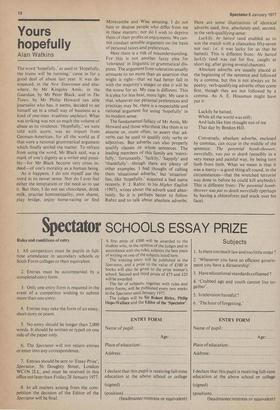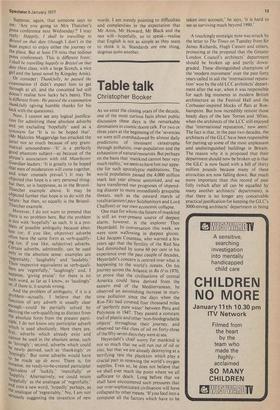Luckily he batted, While all the world was still; And
lads like him thought not of me That day by Bredon Hill.
Conversely, absolute adverbs, enclosed by commas, can occur in the middle of the sentence: The potential bonth-thrower, mercindly, was put to death (possibly in a very messy and painful way, by being torn limb from limb. What we mean is that it was a mercy—a good thing all round, in the circumstances—that the wretched terrorist was done in before he could kill anybody). This is different from: The potential bombthrower was put to death inercilally (perhaps by having a chloroform pad stuck over his face). Suppose, again, that someone says to me: 'Are you going to Mrs Thatcher's Press conference next Wednesday?' I may reply: Happily, I shall be travelling to Bristol on that date (though 1 don't in the least expect to enjoy either the journey or the place. But at least I'll miss that tedious press conference). This is different from: shall be travelling happily to Bristol on that date (first class, with a large Scotch, a nice girl and the latest novel by Kingsley Amis).
Or consider: Thank!idly, he passed the examination (I didn't expect him to get through at all, and the conceited lad still doesn't realise how lucky he's been). This IS different from: He passed the examination thankfully (giving humble thanks for his luck with the questions).
Now, I cannot see any logical justification for admitting these absolute adverbs and yet excluding 'hopefully' used as a synonym for 'It is to be hoped that'. (Mr Malcolm Muggeridge has attacked the latter not so much because of any grammatical unsoundness—le is a perfectly good phantom subject—as because of the Phrase's association with old Manchester Guardian leaders: 'It is greatly to be hoped that men of moderation will come together, and wiser counsels prevail.') It may be Objected that hope is a very personal thing: but then, so is happiness, as in the BristolThatcher example above. It may be Objected further that hope is to do with the future: but then, so equally is the BristolThatcher example.
However, I do not want to pretend that there is no problem here. But the problem is not with 'hopefully' as such. It is a problem of possible ambiguity because absolute (or, if you like, objective) adverbs pften have the same form as verb-qualifyIng (or, if you like, subjective) adverbs. Certain adverbs, admittedly, can be used ?nly in the absolute sense: examples are regrettably ,"laughably' and 'laudably.' Their respective equivalents as verb-quali6ers are 'regretfully,' laughingly' and, 1 suPpose, 'giving praise': for there is no such word, as far as I know, as laudingly. or, if there is, it sounds wrong.
And the problem of ambiguity, if it is a Problem—actually, I believe that the function of any adverb is usually clear enough—could be partially solved by deriving the verb-qualifying as distinct from th.e absolute form from the present partieiPle. I do not know any participlar adverb which is used absolutely. Here there are, 1St, adverbs which already exist and
cannot be used in the absolute sense, such 'lovingly': second, adverbs which could ,ne newly derived, such as 'thank ingly' or hoPingly.' But some adverbs would have
to be made up de novo. There is, for instance, no ready-to-be-created participlar e, quivalent of 'luckily,' mercifully' or „haPplily.' Alternatively, we could retain noPefully' as the analogue of 'regretfully,' and coin a new word, 'hopedly' perhaps, as the.analogue of 'regrettably.' No, I am not seriously suggesting the invention of new
words. I am merely pointing to difficulties and complexities in the expectation that Mr Amis, Mr Howard, Mr Black and the rest will—hopefully, so to speak—realise that English is not as simple as they seem to think it is. Standards are one thing, dogmas quite another.



































 Previous page
Previous page